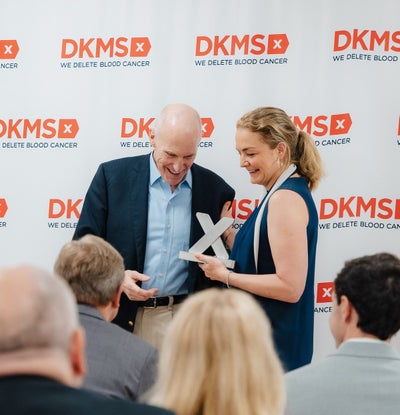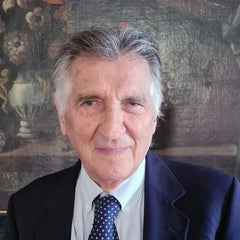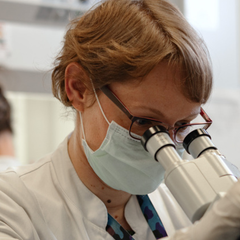DKMS honors Professor Carl June for his Groundbreaking Work
The exceptional physician-scientist received the DKMS Mechtild Harf Science Award for his achievements in cancer immunology
Charlotte, NC, July 12, 2023 - DKMS honors Professor Carl H. June for his outstanding achievements in cancer immunology with the DKMS Mechtild Harf Science Award 2023. Throughout his distinguished career, the physician-scientist has made significant contributions to the field of immunology, including his pioneering work on the use of T cells in cancer. He was instrumental in the development of chimeric antigen receptor (CAR)-T cell therapy, which has proven remarkably effective in treating patients with relapsed and refractory leukemia and lymphoma. Moreover, his work has not only created a paradigm shift in the treatment of blood cancers, but it also has the potential to improve treatment options for solid cancers, chronic infections, and autoimmune diseases in the future. Already, numerous preclinical and clinical trials are underway, which hold great promise not only for the scientific community, but most importantly for all affected patients and their families.

According to the WHO, a staggering 19 million people worldwide are diagnosed with cancer each year. For many of those suffering from various types and stages of cancer, there is no effective cure. For researchers, however, this status quo is simply unacceptable - they look at every angle, explore all possibilities, and no path is too far or too arduous for them. Therefore, it sometimes happens that, after decades of effort, something incredible happens - a sea change - a completely new drug is introduced to the market that has a substantial impact on the lives of those affected for good. This is exactly how the story of physician-scientist Professor Carl H. June unfolded. His research changed the world and continues to keep us in suspense.
Carl June is the Richard W. Vague Professor in Immunotherapy, Director of the Center for Cellular Immunotherapies, and Director of the Parker Institute for Cancer Immunotherapy in the Perelman School of Medicine at the University of Pennsylvania. Following his early report of synthetic T cell activation nearly 30 years ago, June successfully developed a method of producing CAR-T cells to treat refractory and relapsed leukemia. This technology, which involves the genetic reengineering of a patient’s T cells to combat their disease, is the first gene transfer therapy technique that has demonstrated sustained success in cancer patients and has shown tremendous promise for the treatment of hematological malignancies. June demonstrated that it is possible to genetically alter patient-derived T cells to enable them to specifically recognize and kill cells that overexpress certain proteins, such as the CD19 (cluster of differentiation 19) antigen.
Dr. June's work has seen unprecedented success in clinical trials, leading to remarkable remission rates in patients who had exhausted all other treatment options. Some of the earliest patients treated have experienced long-lasting remissions stretching past ten years. Since then, the field of research has developed enormously. There are now six U.S. Food and Drug Administration (FDA)-approved CAR-T cell therapies for multiple blood cancers. This form of precision medicine represents the first therapy ever developed entirely in an academic setting to receive breakthrough therapy designation by the FDA.
"In recent years, there have been few successes in medicine as great as CAR-T cell therapy. It has already led to a rethinking in the treatment of blood cancer and it still holds much promise for the future – also in other disease areas. Thanks to this new form of treatment, even terminally ill patients can regain hope - this is not only remarkable for science, but above all invaluable for our patients," says Prof. Marcel van den Brink, Chairman of the DKMS Medical Council.
June and his research team at Penn Medicine’s Abramson Cancer Center continue to report on numerous aspects of fundamental CAR-T cell biology including applications in chronic infections and autoimmune diseases. His revolutionary work will undoubtedly leave a lasting impact, inspiring future generations of scientists and paving the way for further breakthroughs in immunotherapy. Most importantly, his research gives hope to patients and their families, as CAR-T cells have now been given to more than 15,000 patients around the world.
"It is a great honor to be selected for the DKMS Mechtild Harf Science Award. I join the ranks of many other great physicians and scientists who have already received this award. I share with the Harf family the sad story of losing a beloved family member far too soon, so it means a lot to me that we can meet in this way and toast to the future of cancer treatment,�” says Dr. June. ”I thank DKMS and my many brilliant colleagues, along with all of the patients and their families who have put their trust in our research."
DKMS is committed to saving the lives of as many patients as possible. New and innovative approaches help to increase patients‘ chances of success, yet at the same time we must ensure access to these therapies is available to all those in need. Dr. June is being awarded because his leadership and advocacy have propelled the field of immunotherapy forward, ensuring that innovative treatments are accessible to those who need them most. A remarkable scientist with an incredible track record, he is also a strong believer in equitable access to therapy everywhere in the world.
The award is named after Mechtild Harf, mother of two, who suffered from leukemia and passed away in 1991. Her husband, Peter Harf, founded DKMS that same year. Since then, DKMS has grown to be one of the leading international organizations in the field of stem cell transplantation, with a multi-faceted approach to saving the lives of patients with blood cancer and other hematopoietic disorders.
Press contact: DKMS – Global Corporate Communications – Laura Schulz – lschulz@dkms.de – http://www.dkms.org
About DKMS
DKMS is an international non-profit organization dedicated to saving the lives of patients with blood cancer and blood disorders. Founded in Germany in 1991 by Dr. Peter Harf, DKMS and the organization’s over 1,100 employees have since relentlessly pursued the aim of giving as many patients as possible a second chance at life. With over 11.5 million registered donors, DKMS has succeeded in doing this more than 105,000 times to date by providing blood stem cell donations to those in need. This accomplishment has led to DKMS becoming the global leader in the facilitation of unrelated blood stem cell transplants. The organization has offices in Germany, the US, Poland, the UK, Chile and South Africa. In India, DKMS has founded the joint venture DKMS-BMST together with the Bangalore Medical Services Trust. International expansion and collaboration are key to helping patients worldwide because, like the organization itself, blood cancer knows no borders.
DKMS is also heavily involved in the fields of medicine and science, with its own research unit focused on continually improving the survival and recovery rate of patients. In its high-performance laboratory, the DKMS Life Science Lab, the organization sets worldwide standards in the typing of potential blood stem cell donors.


